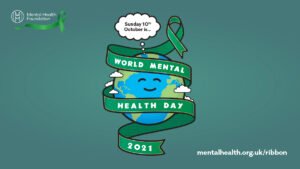08 October 2021
World Mental Health Day: ‘Mental health in an unequal world’
Each year, on 10 October, World Mental Health Day aims to raise awareness of mental health issues around the world and to mobilise efforts in support of mental health. The theme this year, ‘mental health in an unequal world’, has been set by the World Federation for Mental Health.
World Mental Health Day provides an opportunity for all stakeholders working on mental health issues to talk about their work, and what more needs to be done to make mental health care a reality for people worldwide.
To help you raise awareness and get your teams involved in your workplace, Mental Health Foundation has produced a series of World Mental Health Day posters and social media graphics, which are free to download.
‘Mental Health in an Unequal World’

The theme for 2021 was chosen in a global vote by World Federation for Mental Health (WFMH) members, stakeholders and supports. The thought behind the decision is that the world is becoming increasing polarised in terms of the gap between the wealthiest and those living in poverty, which shows no sign of decreasing.
WFMH says that access to mental health services remains unequal, with between 75% to 95% of people with mental disorders in low- and middle-income countries unable to access mental health services at all, and access in high income countries is not much better. Lack of investment in mental health disproportionate to the overall health budget contributes to the mental health treatment gap.
It adds that many people with a mental illness do not receive the treatment that they are entitled to and deserve and together with their families and carers continue to experience stigma and discrimination. The gap between the ‘haves’ and the ‘have nots’ grows ever wider and there is continuing unmet need in the care of people with a mental health problem.
Professor Gabriel Ivbijaro MBE JP, WFMH Secretary General, said: “The COVID 19 pandemic has further highlighted the effects of inequality on health outcomes and no nation, however rich, has been fully prepared for this. The pandemic has and will continue to affect people, of all ages, in many ways: through infection and illness, sometimes resulting in death bringing bereavement to surviving family members; through the economic impact, with job losses and continued job insecurity; and with the physical distancing that can lead to social isolation.
“We need to act, and act urgently.”
In March, Peter Kelly, Senior Psychologist for the Health and Safety Executive, told the Safety & Health Podcast that he believes that there are ‘three parallel pandemics going on’.
“I think one is a global recession, which is a pandemic it’s in its own right with loss of jobs, which we know impacts people’s mental health. We have an influenza pandemic, with people going through COVID-19 and then we have a tidal wave of mental health issues happening, where people are experiencing significant levels of mental distress.”
Listen to the full interview with Peter, here…
Source: SHP Online